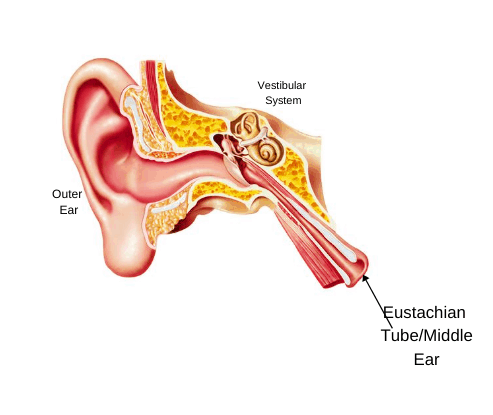Allergies
Allergy symptoms are usually recognized as a stuffy nose, a familiar congested feeling, sneezing, or itching. However, a less common but significant reaction to allergies is dizziness. Although the dizziness frequently feels like it is in your brain, it’s actually your ears! In this case, your eustachian tube, the tube that makes your ear “pop” when you climb in elevation, will make you feel dizzy if you’re having severe allergies. Your Eustachian tube gets filled with mucus when you have a reaction to an allergen as a result of histamine buildup. Histamine is produced when the body is having an allergic reaction, usually causing inflammation and congestion. If this response blocks your Eustachian tube, your ear can’t equalize the pressure, and you end up feeling dizzy.

Allergies are also an underlying cause of Secondary Endolymphatic Hydrops (SEH). SEH is a fluid imbalance in the endolymph located inside your vestibular system. Symptoms of SEH include fullness in your ears, tinnitus, and dizziness. Learn more about SEH here!
If you feel like your dizziness fluctuates as allergy season ebbs and flows, this may be the cause of your dizziness. Luckily, you have options for treatment!
Symptoms & Diagnosis
Allergies can be distinguished by multiple different feelings, most of which we are familiar with. These include:
- Itchy eyes
- Sneezing
- Postnasal drip
- Congestion
- Sore throat
Additionally, a symptom of allergies can be dizziness. Dizziness has multiple definitions, but most commonly with allergies they include:
- Feeling like your brain is spinning
- Lightheadedness
These two kinds of dizziness, lightheadedness and spinning, are common symptoms of many inner ear disorders, so differentiating them from another cause of vertigo or vestibular disorder is important. Typically, when you have allergy-related-dizziness, your symptoms will be related to the environment, seasons, or foods. You might start to notice that every time you are around a certain kind of tree, or when it is “allergy season” you start to feel dizzy. I also find people telling me that they’ve never had allergies, but moved to a new city and aren’t sure why they developed them all of the sudden (1). Keeping track of your symptoms with a journal or log to find triggers can be an important step in finding what it is you’re allergic to in order to seek treatment. Despite this feeling being very disruptive and frustrating, it is usually treatable!
Treatment
Treatment for allergy-induced-dizziness is treated a lot like other allergies. A physical therapist is not the practitioner most qualified to treat your allergies, if allergies are the only cause of your dizziness, you should seek help from an allergist or your primary care provider. When you find out what is causing your allergies, there are a few ways to treat the symptoms.
- Diet
- Allergy shots
- Allergy Medications
Diet
Often we are allergic to something in our diets when we don’t realize it. Even in adulthood and as we age, we can develop allergies, so something that you may have been eating your whole life can suddenly cause an allergic reaction. The most common culprits are nuts, corn, soy, dairy, citrus fruits, nightshade vegetables, wheat, foods containing gluten, pork, eggs and seafood (2). If you suspect your dizziness is related to your diet, you can try an elimination diet. To do this, first determine which food or foods you suspect may be causing your symptoms. Next remove those foods from your diet for 2-3 weeks. If your symptoms decrease, you may be allergic to one or multiple of them. Then, reintroduce the foods one at a time. If your symptoms increase, you are now aware of what is causing your dizziness and can eliminate it for good. Don’t forget to always consult your qualified healthcare provider prior to changing your diet!
Allergy Shots
For more severe allergies, an allergist, or other qualified healthcare provider, can provide allergy shots to slowly desensitize your body to the allergen causing your symptoms. You may have a multiple-injection course of treatment. Gradually, your body will build a defense to the allergen, treating the root cause, therefore reducing your dizziness. There are usually two phases to receiving allergy shots. Phase 1 is the build-up phase, where you receive shots one to three times a week, gradually increasing the dosage at each appointment. Then, when you enter Phase 2, you will receive monthly shots for three to five years depending on your specific case (3).
Allergy Medications
There are many brands and forms of allergy medications, but they are all focused on treating the same factor — histamine (4). Allergy medications, or antihistamines, treat allergy symptoms by reducing the reaction to histamine. Many antihistamines cause drowsiness, so be careful about operating or driving machinery after taking the medication, always pay close attention to the directions, and be sure to contact your doctor before taking a new or different medication. Ultimately, when taking an antihistamine, you are looking to treat the allergies to reduce the symptoms of dizziness.
Physical Therapy
If allergies are the underlying cause of your dizziness, a physician will help you treat these symptoms, but if you have continual dizziness and imbalance, physical therapy is likely right for you. Physical therapy for SEH is in the form of vestibular rehabilitation. Your therapist will help you with your balance, mobility, activity tolerance, and energy levels. Your PT should also be able to assist you with dietary recommendations for SEH and other ways to manage your symptoms!
Sources:
(1) Jewell, T. (2020, March 30). Can You Develop Allergies in Adulthood? What Science Says. Retrieved August 20, 2020, from https://www.healthline.com/health/allergies/can-you-develop-allergies
(2) Raman, R. (2017, July 2). How to Do an Elimination Diet and Why. Retrieved August 20, 2020, from https://www.healthline.com/nutrition/elimination-diet
(3) Mayo Clinic Staff. (2020, February 08). Allergy shots. Retrieved August 20, 2020, from https://www.mayoclinic.org/tests-procedures/allergy-shots/about/pac-2039287
(4) Cafasso, J. (2020, June 30). Allergies and Dizziness. Retrieved August 20, 2020, from https://www.healthline.com/health/allergies/dizziness

